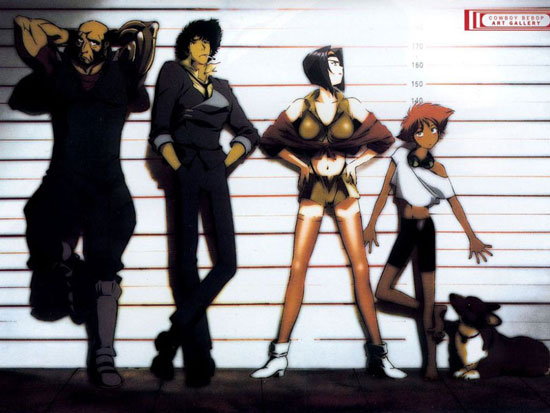
Premise-wise, Cowboy Bebop probably sounds very similar to Firefly. In both cases you've got a crew of lovable misfits drifting around a loosely policed galaxy looking for enough work to pay the repair bills and keep food on the table. The Bebop's Crew is smaller, and they work as bounty hunters (called "Cowboys" in the series) instead of outlaws, but the real distinction between the two shows is a matter of style. While Firefly is solely a western within it's sci-fi trappings, Bebop is by turns, a Hong Kong Kung-Fu flick, a film noir, and a Jazz Odyssey.
In fact, it's the music that makes the show. Series director Shinchiro Watanabe is as renowned for awesome music as Joss Whedon is for witty dialogue, and Yoko Kanno, who might be considered the John Williams of anime, penned the score. Listening to the opening and closing themes will do your ears good and give you a feel for the general poles of the show (funky and frenetic vs. soulful melancholy) , but there is so much more to hear before you can really appreciate the incredible range of the soundtrack (and what I've linked here just tips the 'berg). Musicality is a general theme for the show, with episodes referred to as sessions and named after record titles or various pieces of music.
 Meet the cast and crew of the Bebop. From left to right we've got ex-cop Jet Black, ex-triad Spike Spiegal, femme fatale Faye Valentine, crazy girl Ed, and Ein the data dog.
Meet the cast and crew of the Bebop. From left to right we've got ex-cop Jet Black, ex-triad Spike Spiegal, femme fatale Faye Valentine, crazy girl Ed, and Ein the data dog.The eclectic nature of the music reflects on the quality of the writing. There is the eastern emphasis on the journey as opposed to the ending, but unlike so many other anime and manga, the narrative does come to a coherent and decisive conclusion. There aren't any plot holes either, at least, not in the sense of incoherence, though it does suffer from cavernous blind spots which move beyond titillation and into exasperation; a distinction I measure by the moment viewers stop thinking "I wonder what happened there..." and start wondering "Did the writers even bother?" In this case, I am referring to the "main plot" of the series that focuses on Spike's history with the criminal element and his missing lady-love Julia. What little we learn of it is compelling enough to move you along with the story, but when looking back at it you can't help feel that something significant was left unsaid. Part of the problem may be that I love the enigmatic (if shallow) main bad-ass, Vicious too much; possibly because he reminds me of another ruthless, effiminate silver-haired swordsmen.
Before bidding a fair well to space westerns for the foreseeable future, I must acknowledge that Cowboy Bebop is not the only anime to do space cowboys, and some may dispute my claim that it does them best; namely Trigun fans. I'd be lying if I tried to tell you I enjoyed Trigun as much as Bebop, but before you decide to nail me to your cosplayed crucifix cannons (officially my strangest alliteration ever), allow me to qualify my decision: Trigun is a better Western, but a worse Space Western because the space aspect of the show is restricted to just a couple of episodes. Mostly it's just Vash The Stampede wandering around a barren desert planet, shooting at folk without killing them, devouring doughnuts and shouting "Love and Peace!". In case you ever wondered who would win a shoot out between Vash and Spike, allow me to present you with the following hypothetical:
For those wondering why the Japanese have such a yen (or should I say Zen?) for Westerns, the simple answer is that they are trying to get back at John Sturges for stealing the plot of Akira Kurosawa's Seven Samurai to make The Magnificent Seven. Feeble jokes aside, our romanticization of the gunslinger parallels Japan's treatment of Samurai, and I believe it accounts for much of the cross cultural genre bending.
Interestingly enough, Shichiro Watanabe's other genre blending masterpiece is about swordsman in the Edo period; Samurai Champloo. As I mentioned earlier, Watanabe is renown for musical shows, and Champloo happens to be Hip-hop flavored, which means it's about as historically accurate as Cowboy Bebop is historically predictive. Fortunately, it's also just as entertaining, and frequently entertaining in the same ways. Once again, we've got a two guy one girl set up, (though we've ditched the dog and the kid who were included in Bebop to lighten up the show's blueszy atmosphere) and we follow the trio through a trail of odd jobs as they seek out "The Samurai who Smells of Sunflowers". Unlike Bebop, the story telling is completely rooted in the eastern school of the journey, with the plot mounting up to a final duel between the two guys that never ends up happening.
Yoko Kanno doesn't come around again, presumbly because hip hop ain't her thang, but the music continues to impress anyway, and in closing, I present you with this link to Samurai Champloo's closing theme. Til next time, See You Space Cowboy.


No comments:
Post a Comment